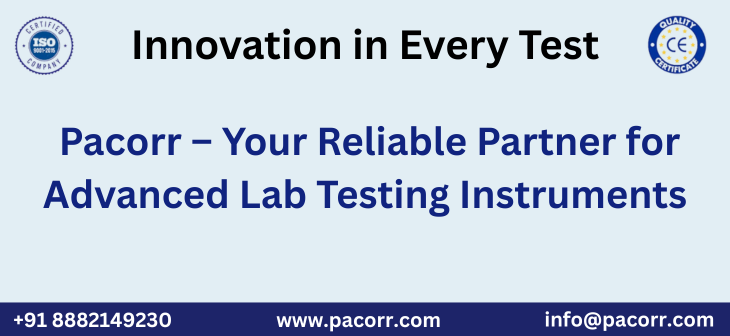
Introduction: Understanding Pacorr Tensile Testing Machine
Pacorr Tensile Testing Machine is a key solution for quality control in a wide range of industries. As product reliability and safety standards continue to rise, manufacturers rely on advanced tensile testing machines to ensure the materials they use meet all required mechanical properties. Pacorr stands out in the testing instruments sector, offering high-precision equipment designed to evaluate the tensile strength, elongation, and overall mechanical behavior of metals, plastics, rubbers, textiles, and more. Understanding what a tensile testing machine is, how it works, and why it is essential can make all the difference for companies aiming to achieve both product quality and compliance with international standards.
What Is a Tensile Testing Machine
A tensile testing machine, also known as a universal testing machine (UTM), is a laboratory instrument used to determine how materials react under uniaxial tension force. The core function of the tensile testing machine is to pull materials apart and record their response to stress, ultimately measuring properties such as tensile strength, yield strength, elongation, and breaking point. Pacorr’s tensile testing machines are equipped with cutting-edge features, digital displays, and robust load cells to ensure precise measurements for every test.
Importance of Tensile Testing in Modern Manufacturing
In today’s global manufacturing environment, tensile testing has become a non-negotiable process for quality assurance. Industries such as automotive, aerospace, construction, packaging, medical devices, and consumer goods all require detailed mechanical property analysis to ensure materials perform as intended. By integrating Pacorr’s tensile testing machines into their processes, companies can:
- Ensure Compliance: Meet ASTM, ISO, and other international standards for material properties.
- Enhance Product Safety: Identify weaknesses in materials before production or deployment.
- Reduce Costs: Detect substandard raw materials early, preventing costly recalls and product failures.
- Support R&D: Evaluate new formulations or composite structures with precise mechanical data.
Key Product Related Keywords
- Tensile Testing Machine
- Double Column Tensile Testing Machine
- Universal Testing Machine
- Tensile Strength Tester
- Tensile Test Equipment
- Tensile Testing Machine - Capacity- 5000 KGF
- Material Testing Instruments
- Digital Tensile Testing Machine
How Does a Tensile Testing Machine Work
Basic Principle of Operation
The fundamental principle of a tensile testing machine is quite straightforward. The test specimen is clamped between two grips. One grip is fixed, while the other is movable and connected to a motorized drive. As the movable grip pulls the sample at a constant speed, the load cell measures the amount of force applied. The entire process is precisely monitored and recorded by advanced software, which provides a stress-strain curve and comprehensive data analysis.
Step-by-Step Working Process
- Preparation of Test Specimen
The first step is to prepare a sample that conforms to standardized dimensions, such as dog-bone shapes for plastics or flat strips for metals. - Mounting the Sample
The sample is securely mounted between the machine’s upper and lower grips to avoid any slippage or misalignment during the test. - Setting Parameters
Operators input specific test parameters, including crosshead speed, gauge length, and load limits, according to material standards or customer requirements. - Commencement of Test
The movable grip begins to pull the sample at a pre-set speed, and the load cell starts recording the force applied. - Data Acquisition
As the sample stretches, the machine continuously captures load and elongation data. The digital display and software plot real-time stress-strain curves. - Material Failure
The test continues until the specimen breaks or reaches a predetermined elongation. At this point, all crucial mechanical properties have been recorded. - Result Analysis
The machine’s software provides detailed reports, including ultimate tensile strength, yield strength, elongation at break, and modulus of elasticity.
Types of Tensile Testing Machines Offered by Pacorr
Pacorr offers a variety of tensile testing machines to suit different materials, applications, and load capacities:
- Double Column Tensile Testing Machine
Suitable for high-capacity tests, this model is ideal for metals, heavy plastics, and composites. The dual-column design ensures stability and precise force distribution, making it reliable for rigorous testing environments. - Digital Tensile Testing Machine
Designed for advanced labs, this machine features an intuitive digital interface, microprocessor-based control, and USB connectivity for data storage and analysis. - Tensile Testing Machine - Capacity- 5000 KGF
With a robust build, this model is engineered to test large samples or materials requiring high loads. Its versatility supports a wide range of testing standards and industries.
Advanced Features of Pacorr Tensile Testing Machines
Pacorr’s machines are renowned for their precision engineering and user-centric features:
- High-Accuracy Load Cells: Delivering repeatable and accurate results.
- Microprocessor Control: Ensures automation and minimizes human error.
- Digital Display: Real-time monitoring of force, elongation, and other parameters.
- Wide Range of Accessories: Extensible for testing wires, rods, films, yarns, and more.
- User-Friendly Software: Simplifies test setup, data acquisition, and analysis.
- Robust Construction: Guarantees long service life even under heavy usage.
- Safety Features: Automatic stop at sample breakage and overload protection.
Applications of Tensile Testing Machines
Pacorr tensile testing machines play a vital role across diverse sectors:
- Automotive Industry: Testing metal sheets, seat belts, airbags, and plastics for strength and durability.
- Construction: Assessing steel bars, rebar, and concrete reinforcements for compliance with safety standards.
- Packaging: Evaluating films, foils, and flexible packaging materials for performance during shipping and storage.
- Textiles: Measuring yarn, fabric, and synthetic fibers to ensure comfort, durability, and resistance.
- Medical Devices: Verifying catheters, sutures, and other medical components for reliability.
- Aerospace: Ensuring lightweight yet strong composite materials meet stringent requirements.
Benefits of Using Pacorr Tensile Testing Machine
- Enhanced Product Quality: Reliable detection of defects and assurance of material integrity.
- Consistent Results: Automated controls and precise load measurement reduce operator variation.
- Compliance with Global Standards: Ability to configure machines to meet ASTM, ISO, and BIS testing standards.
- Comprehensive Reporting: Digital data collection and exportable reports for audits and certification.
- Increased Efficiency: Quick setup and fast testing cycles optimize laboratory productivity.
Key Standards Related to Tensile Testing
Pacorr’s tensile testing machines are compatible with a range of international standards, such as:
- ASTM D638 (Plastics)
- ASTM A370 (Metals)
- ISO 527 (Plastics)
- ISO 6892 (Metals)
- ISO 37 (Rubber)
- ASTM D412 (Rubber and Elastomers)
- ASTM D882 (Thin Plastic Sheeting)
Selecting the Right Tensile Testing Machine
Choosing the correct tensile testing machine depends on several factors:
- Material Type: Different grips and load cells are required for metals, polymers, and textiles.
- Load Capacity: Ensure the maximum force of the machine matches the strength of test samples.
- Accuracy Requirements: Look for precision load cells and high-resolution extensometers.
- Compliance Needs: Select models that conform to relevant international standards.
- Budget and Space: Compact digital models are ideal for small labs, while double column machines suit industrial settings.
Maintenance and Calibration for Accurate Results
Maintaining your Pacorr tensile testing machine is essential for sustained accuracy:
- Regular Calibration: Schedule annual calibration to traceable standards for consistent measurements.
- Cleaning and Lubrication: Prevent dust accumulation and ensure smooth mechanical operation.
- Software Updates: Keep testing software current to benefit from new features and improved usability.
Conclusion: Why Choose Pacorr Tensile Testing Machines
Pacorr Tensile Testing Machines empower industries to achieve superior product quality, compliance, and safety. With advanced features, a robust range of capacities, and compatibility with leading international standards, Pacorr stands as a trusted name in the material testing field. Whether you operate in automotive, packaging, textiles, or research, integrating a Pacorr tensile testing machine into your workflow is a smart investment in reliability and performance.
For more information about the full range of Pacorr tensile testing machines, including Double Column Tensile Testing Machines and models with a capacity of up to 5000 KGF, or to request a quote, visit Pacorr.com. Experience the next level of quality control with Pacorr’s industry-leading material testing solutions.
FAQ
Q1. What is a tensile testing machine used for?
A tensile testing machine measures the strength, ductility, and elongation properties of materials under tension to ensure they meet quality and safety standards.
Q2. What materials can be tested with Pacorr tensile testing machines?
Pacorr tensile testing machines can test metals, plastics, polymers, textiles, rubber, composites, films, and wires.
Q3. What are the advantages of a Double Column Tensile Testing Machine?
Double Column machines offer increased load capacity and greater stability, ideal for high-strength materials and large samples.
Q4. What is the typical capacity of a Pacorr tensile testing machine?
Pacorr offers tensile testing machines with various capacities, including models up to 5000 KGF, to suit a range of applications.
Q5. How can I ensure accurate results with my tensile testing machine?
Regular calibration, proper maintenance, and using the correct grips and settings are essential for reliable testing outcomes.
Thanks to Pacorr Testing instruments, we have all the required quality testing instruments that have helped us to ensure the best quality delivered to our clients.

Danish
Fair Exports Pvt. Ltd.

